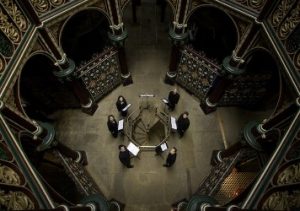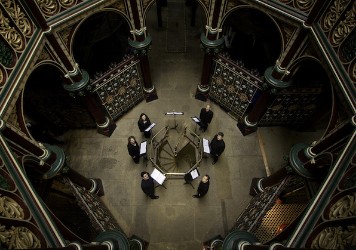 The Clerks don’t do ordinary concerts. They like to play around and to challenge our expectations of how music can delight us and move us, how it can entertain us and enlighten us. Last time I saw them in Durham, two years ago, they roped the audience into a fascinating experiment (and gave us buttons to press!) as part of a study into how the human ear and brain process multiple streams of sound. This time, in a concert at St Margaret’s Church for MUSICON, The Clerks, with organist William Whitehead, took us on an investigation into the real life of Johann Sebastian Bach, looking into the stories of his youth, putting ourselves into the shoes of his earliest musical colleagues, and filling in some blanks in his own notebook.
The Clerks don’t do ordinary concerts. They like to play around and to challenge our expectations of how music can delight us and move us, how it can entertain us and enlighten us. Last time I saw them in Durham, two years ago, they roped the audience into a fascinating experiment (and gave us buttons to press!) as part of a study into how the human ear and brain process multiple streams of sound. This time, in a concert at St Margaret’s Church for MUSICON, The Clerks, with organist William Whitehead, took us on an investigation into the real life of Johann Sebastian Bach, looking into the stories of his youth, putting ourselves into the shoes of his earliest musical colleagues, and filling in some blanks in his own notebook.
In Bach’s church music, you’re never more than a few inches away from a Lutheran chorale, and it was the chorales that formed the framework of this concert; chorales as serious statements of deep spirituality, chorales as a hook which to hang new decoration, and chorales moulded into splendid jokes. Bach’s congregations would have lived and breathed these hymns, and so to get us into that world, the concert began with us all singing All People that on Earth do Dwell – one of those hymns that courses through the Anglican bloodstream, but which is sung to a tune that Bach and his congregation knew too.
Organists have always been expected to improvise and elaborate on hymn tunes, often to fill awkward gaps in services, and in 1713, Bach decided to write some of his in a little book, his Organbüchlein. He wrote down on each page of his notebook which chorales he was going to include, but he only got round to writing 46 out of 164. William Whitehead has taken on job of filling in those missing pages, collecting preludes by contemporary composers for the ones that Bach missed. He performed some of these tonight, with The Clerks singing the original chorales in a simple, unfussy style, presenting them as what they are – hymns for everyone. The highlight for me of this fascinating sequence was Jacques van Oortmerssen’s prelude on Nun ruhen alle Wälder (‘Now all the woods are resting’), in which the organ created the sound of gently rustling leaves arching over the melody. and I also enjoyed the world premiere of Naji Hakim’s contribution, Spiritus sancti gratia which touched the tune with startlingly bright harmonies.
Two specially created sequences looked at elements of Bach’s biography. The Moonlight Manuscript told the myth about Bach stealing manuscripts from his elder brother’s locked cabinet to copy and study by night, illustrated by witty snippets of music from Bach and from the works he had apparently copied (‘he has showed strength with his arm’ from a Magnificat by Pachebel was most apt). The Clerks slipped seamlessly between narration and singing, or both together, and William Whitehead illustrated Bach’s organ studies with the Praeludium in E-minor by Bruhns, a pot-pourri of early baroque styles and techniques, played with such inventiveness that you could imagine the teenage musician discovering it all for himself. The Moonlight Manuscript ended by showing, literally, how renaissance polyphony also fed into Bach’s music, in a brilliant sequence that fused the Agnus Dei from Palestrina’s Missa Sine nomine into Bach’s monumentally lovely Dona Nobis Pacem from the B-Minor Mass, and it was all sung with such a flowing legato that the two pieces just melted together.
The Moonlight Manuscript was entertaining. The centrepiece of the second half, Christopher Fox’s The Arnstadt Passion was side-splittingly hilarious, and I was doubled over with silent laughter for most of it. Like a proper Bach cantata, Fox’s piece combines Bach chorales, recitative and a Passion chorus, all sung in comedy Anglo-German, in which the congregation at Arnstadt demonstrate their disapproval of Bach’s innovative treatment of their beloved chorales (choice lines – ‘Du hast gefuckt die Melodie’… ‘Es ist genug! Es macht uns mad’); the difficulties of singing his music ‘we could not keep the pitch’ to the tune of ‘wir haben ein Gesetz’; and finally of his extended absence in Lübeck (‘Lübeck Du musst it lassen’). I had the feeling that there were probably many more layers of humour in this that I missed – I’d love to see the score. The Clerks sang it with impressively straight faces, and for all the brilliant wit, it did make a serious point about the explosive effect Bach’s music must have had on those solidly traditional German burghers.
All this, the chorale preludes and the two ‘cantatas’ would have been enough by themselves, and so the performance of Jesus meine Freude added onto the end made the concert rather long – although with the tantalising quotes from it that came during The Moonlight Manuscript, perhaps it would have been cruel not to let us have the whole thing. Some of the faster passages were a little raggedy and the balance wasn’t the best, particularly in Gute nacht when the alto melody was overpowered by the outer parts. It was overall though an expressive and thoughtful performance, which built up nicely to the motet’s spiritual climax in the central movement. There was excitement in the pianissimos on ‘nichts’ in the second movement and bass James Arthur was magnificent in his little flourish on ‘Tobe Welt’. The beauty of Jesu meine Freude to me is in the way that Bach mixes simple hymn texts and some fiendishly complicated bits of theology from Paul’s Epistle to the Romans; he takes away the heaviness from the theology and lays it onto the simple hymn words, balancing the scales, and in doing so convinces you that you too understand and believe it all. This was what really came across in The Clerks’ performance: there an unshakeable faith and trust shining through the music, that the good people of Arnstadt would surely have understood too.








